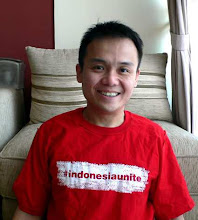Tantri Yuliandini, The Jakarta Post, Jakarta
Roni Siswandi loves to toil for his profession -- and the world acknowledges it -- but he hates publicity.
When The Jakarta Post arrived for an interview, his very first remark was, "I only agreed to this interview because I have a debt to repay to archaeology and if this is the way to do it, then so be it."
The low-profile 49-year-old then set another condition for the interview: Don't put his picture on the paper. "I'll give you an interview and that's it."
It was indeed a rare interview, as Roni is well known for his media shyness. He prefers to work behind the scenes and let his wife, textile and batik connoisseur Josephine W. Komara, better known as Obin, stand in the spotlight.
"If you want to talk about Bin House then speak to Mbak Obin, but since it's about archaeology, all right. That's the keyword," Roni said with a grin.
Many believe that Roni is the man behind the success of Bin House, the textile and batik gallery that Obin and her partners established some 20 years ago, but Roni sees himself as an archaeologist whose business happens to be in textiles.
In fact, Roni attributes his success to archaeology. He says the experience he gained from the School of Archaeology at the University of Indonesia between 1974 and 1980 was the major force that shaped his life.
"The knowledge that I received from archaeology influenced me intellectually, mentally, and morally, and made me who I am today. The way I work, how I think -- all come from the archaeological (thinking method)," he says.
Roni says he employs archaeological methodology even in business matters and especially in his job as head of research and development at Bin House.
The youngest of eight children, Roni spent his childhood in the slums of Tanah Abang, Central Jakarta. His father, a crop trader, left the family when Roni was only 4« years old and then returned when he was 11 years old.
"It was only through God's benevolence that my mother managed to raise her children properly. Imagine raising kids on the banks of that filthy river. It was amazing that none of us grew up to be criminals," said Roni, who claims to have no heroes or role models.
Although he says that his family was never academically oriented, Roni went to university. He chose archeology simply because of the adventurous nature of the field.
"I thought archaeology was like Thor Heyerdahl's adventures," he said. (Thor Heyerdahl was a Norwegian explorer and archaeologist famous for his Kon Tiki raft expedition across the Pacific.)
When he was in his fifth year at university, Roni started teaching as assistant lecturer, and in 1981 he officially became a lecturer at the university.
"When Pak Bambang, Pak Buchori, and Pak Oti asked me to help out at the department, I accepted it only after they assured me that I could still continue with my business. Pak Bambang said it was only a matter of good time management," he recalled, referring to the three respected archaeologists Bambang Sumadio, Buchori, and Mundardjito.
Besides teaching at the University of Indonesia and studying for his Masters degree at the Anthropology Department of the same university, Roni also worked for his brother's plastic manufacturing company until 1986.
His passion for textiles, particularly batik, was inspired by long-time friend Obin who asked him to join Bin House in 1986.
"I had wanted to join her company in the administrative areas only, but she kept pushing me. She believed that with my knowledge as an archaeologist, I was more than capable of understanding batik and textiles in general. She was right," he said, while picking out bits of tobacco from an empty box of Gudang Garam Signature Menthol Mild.
"Some people are unlucky enough to never know their own limitations. Others have friends, relatives, lovers, to open their eyes for them. She's the one who opened up my eyes, opened me up to try every possibility, so I could make the right decision." Roni and Obin were eventually married in 1994.
As the business became more and more successful, however, Roni found himself having less and less time to read, study, and update his knowledge as befits a lecturer.
His students in later years recalled having to fax assignments to Japan in order for Roni to grade them on time, and during his busiest times, Roni would also miss classes regularly and make them up towards the end of the semester.
In 2000, the lecturer -- who was familiar to students in his white Chinese-style shirt -- decided to quit teaching altogether.
"It would be stupid and unfair if I had persisted in teaching merely for the prestige of being a lecturer, and not admitting to the fact that I was being left behind (in knowledge)," Roni said, explaining that he would rather fail at becoming an academic than letting down those who depended on Bin House for their livelihood.
At Bin House, Roni continues to create new designs, particularly for batik, which is its claim to fame.
Batik can be seen as two different concepts, he explained, as a design and as a technique. "As a design, those fabrics that you find in abundance in Mangga Dua could also be classified as batik, but they are just textiles with a batik motif."
In contrast, to both Roni and Bin House, batik is the technique of using wax as a resisting agent to control coloration.
"There's no denying that some particular motifs bring to mind the image of batik, but if it is made through other media (aside from wax), then I don't consider it as batik," he stated.
Roni said that he viewed batik as a tradition different from the tradition of modern printing.
"Its social environment is different, its production unit is different; spatial setting, workforce, and its mentality is different from printing," he said.
Through a long and arduous process, Roni learned the basic of the craft, without any formal training but through lots of reading, trial and error, discussions with local and foreign textile and batik experts, he eventually became an expert himself.
"Even now, I am still in the process of learning, from the first time I committed myself until now," Roni said modestly, explaining that his first lessons came from the study of Bin House's own collection of antique textiles.
This collection was enriched further with the addition of his experimental cloths. "This is another proof of my dominant archaeological trait -- I don't throw away failed experiments, I keep them and study them," he said.
Roni fiercely clings to his belief that batik will never die out in this country. "It has its ups and downs, just like everything else, but batik will not die out particularly because it is affordable by people at all levels of society." According to Roni, Bin House's role, and the role of every batik producer in this country, is to continue to innovate.
"The challenge is to make innovations so that more people will like batik apart from those already inside the batik culture, who appreciate it from within its social and cultural context, and create something beyond that cultural context," Roni explained.
Roni does not believe in patenting his designs, preferring instead to let his new motives enrich the existing treasure trove of Indonesian motifs.
For a man who claims that he does not want to be remembered, Roni has a rather grandiose ambition, which is to establish a museum of textiles and batik within the next five years.
"I could do so much with a museum -- write books, teach people, display cloths so they could come and look -- there is no limit to what I could do".
Features - November 16, 2002
Inspirator hidup dan kreatifitas gue.




